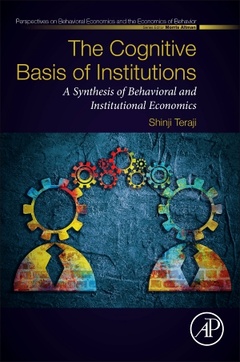Description
The Cognitive Basis of Institutions
A Synthesis of Behavioral and Institutional Economics
Perspectives in Behavioral Economics and the Economics of Behavior Series
Author: Teraji Shinji
Language: English
Subjects for The Cognitive Basis of Institutions:
Keywords
Adaptive behavior; Behavioral economics; Beliefs; Biases; Bounded rationality; Classification; Coevolution; Cooperation; Cultural evolution; Decision-making; Efficiency; Heuristics; Institutions-as-equilibria; Institutions-as-rules; Knowledge; Mind; New institutional economics; Norms; Organizations; Patterns; Property rights; Prosocial behavior; Reputation; Rules; Rules of conduct; Satisficing; Search; Sensory order; Social order; Social preferences; Subjectivity; Transaction costs
366 p. · 15x22.8 cm · Paperback
Description
/li>Contents
/li>Readership
/li>Biography
/li>Comment
/li>
The Cognitive Basis of Institutions: A Synthesis of Behavioral and Institutional Economics synthesizes modern research in behavioral economics with traditional institutional economics. This work emphasizes that institution and agent are inextricably linked, and that both cognitive and institutional processes coalesce to influence human decision-making. It integrates cognition and institution through the behavioral economics theoretical lens of bounded rationality. Methodologically, it develops game-theoretical, complexity and neuroeconomic solutions to unite study of the two areas. The work concludes by proposing general implications for the economic study of decisions using the cognitive-institutional approach, also providing specific recommendations for public policy.
1. Introduction: What Are Institutions?2. Institutions and the Economics of Behavior I3. Institutions and the Economics of Behavior II4. Why Bounded Rationality?5. Emergence of Prosocial Behavior6. Cognition and Order7. Society and Knowledge8. Understanding Institutional Evolution
Graduate and first year PhD students of behavioral economics and institutional economics, and related cognitive perspectives.
- Reveals how institutional structures and individual actions interact and coevolve cognitively
- Connects individual decision-making, decision-making processes and institutional formation
- Unites our understanding of cooperative ‘prosocial’ behavior with the institutional dynamics that may create it
- Discusses the implications of the behavioral-institutional paradigm for paternalism and libertarianism in public policy




